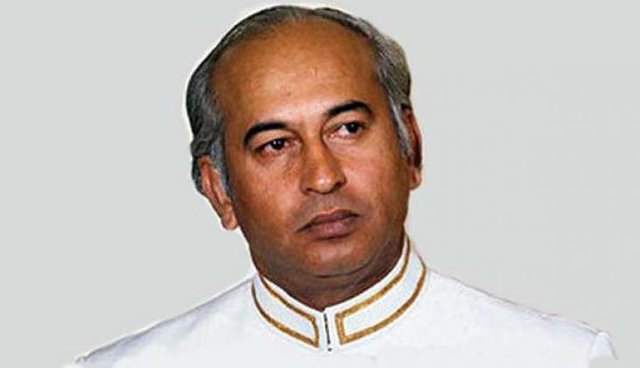Zulfiqar Ali Bhutto Life History Pakistani
Zulfiqar Ali Bhutto was born on January 5, 1928. He was the only son of Sir Shah Nawaz Bhutto. Zulfiqar Ali Bhutto completed his early education from Bombay's Cathedral High School. In 1947, he joined the University of Southern California, and later the University of California at Berkeley in June 1949. After completing his degree with honors in Political Science at Berkeley in June 1950, he was admitted to Oxford.
Zulfiqar Ali Bhutto married Nusrat Isphahani on September 8, 1951. He was called to Bar at Lincoln's Inn in 1953, and the same year his first child, Benazir Bhutto, was born on June 21. On his return to Pakistan, Bhutto started practicing Law at Dingomal's.
In 1958, he joined President Iskander Mirza's Cabinet as Commerce Minister. He was the youngest Minister in Ayub Khans Cabinet. In 1963, he took over the post of Foreign Minister from Muhammad Ali Bogra.
His first major achievement was to conclude the Sino-Pakistan boundary agreement on March 2, 1963. In mid 1964, Bhutto helped convince Ayub of the wisdom of establishing closer economic and diplomatic links with Turkey and Iran. The trio later on formed the R. C. D. In June 1966, Bhutto left Ayub's Cabinet over differences concerning the Tashkent Agreement.
Zulfiqar Ali Bhutto launched Pakistan Peoples Party after leaving Ayub's Cabinet. In the general elections held in December 1970, P. P. P. won a large majority in West Pakistan but failed to reach an agreement with Sheikh Mujib-ur-Rahman, the majority winner from East Pakistan. Following the 1971 War and the separation of East Pakistan, Yahya Khan resigned and Bhutto took over as President and Chief Martial Law Administrator on December 20, 1971.
In early 1972, Bhutto nationalized ten categories of major industries, and withdrew Pakistan from the Commonwealth of Nations and S. E. A. T. O. when Britain and other western countries recognized the new state of Bangladesh. On March 1, he introduced land reforms, and on July 2, 1972, signed the Simla Agreement with India, which paved the way for the return of occupied lands and the release of Pakistani prisoners captured in East Pakistan in the 1971 war.
After the National Assembly passed the 1973 Constitution, Bhutto was sworn-in as the Prime Minister of the country.
On December 30, 1973, Bhutto laid the foundation of Pakistan's first steel mill at Pipri, near Karachi. On January 1, 1974, Bhutto nationalized all banks. On February 22, 1974, the second Islamic Summit was inaugurated in Lahore. Heads of States of most of the 38 Islamic countries attended the Summit.
Following a political crisis in the country, Bhutto was imprisoned by General Zia-ul-Haq, who imposed Martial Law on July 5, 1977.
On April 4, 1979, the former Prime Minister was hanged, after the Supreme Court upheld the death sentence passed by the Lahore High Court. The High Court had given him the death sentence on charges of murder of the father of a dissident P. P. P. politician.
Zulfiqar Ali Bhutto was buried in his ancestral village at Garhi Khuda Baksh, next to his father's grave .
.
Pakistan Peoples Party
Following his resignation as foreign minister, large crowds gathered to listen to Bhutto's speech upon his arrival in Lahore on 21 June 1967. Tapping a wave of anger against Ayub, Bhutto travelled across Pakistan to deliver political speeches. In October 1966 Bhutto made explicit the beliefs of his new party, "Islam is our faith, democracy is our policy, socialism is our economy. All power to the people."[26] On 30 November 1967, at the Lahore residence of Mubashir Hassan, a gathering that included Bhutto, Bengali communist J. A. Rahim and Basit Jehangir Sheikh founded the Pakistan Peoples Party (PPP), establishing a strong base in Punjab, Sindh and amongst the Muhajirs.
Hassan, an engineering professor at UET Lahore, was the main brain and hidden hand behind the success and the rise of Bhutto. Under Hassan's guidance and Bhutto's leadership, the PPP became a part of the pro-democracy movement involving diverse political parties from all across Pakistan. The PPP activists staged large protests and strikes in different parts of the country, increasing pressure on Ayub to resign. Dr. Hassan and Bhutto's arrest on 12 November 1969, sparked greater political unrest. After his release, Bhutto, joined by key leaders of PPP, attended the Round Table Conference called by Ayub Khan in Rawalpindi, but refused to accept Ayub's continuation in office and the East-Pakistani politician Sheikh Mujibur Rahman's Six point movement for regional autonomy.
Welcome to steemit @bachalkhaskheli. Join @minnowsupport project for more help. Checkout @helpie and @qurator projects.
Send SBD/STEEM to @treeplanter to plant trees and get an get an upvote in exchange of your donation (Min 0.01 SDB)
Upvote this comment to keep helping more new steemians
Send SBD/STEEM to @tuanis in exchange of an upvote and support this project, follow for random votes.
Welcome to Steem, @bachalkhaskheli!
I am a bot coded by the SteemPlus team to help you make the best of your experience on the Steem Blockchain!
SteemPlus is a Chrome, Opera and Firefox extension that adds tons of features on Steemit.
It helps you see the real value of your account, who mentionned you, the value of the votes received, a filtered and sorted feed and much more! All of this in a fast and secure way.
To see why 2981 Steemians use SteemPlus, install our extension, read the documentation or the latest release : SteemPlus 2.17.6 : Tips on Busy and bug fixes.
You are welcome to steem community..